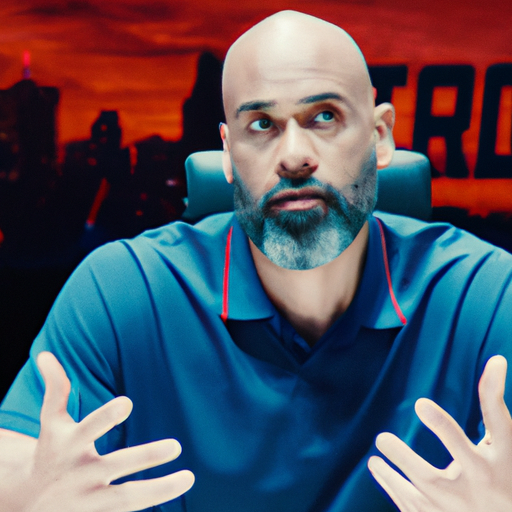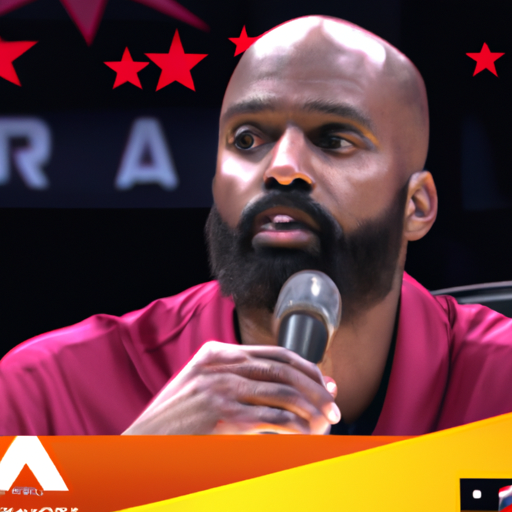Tim Hardaway criticizes James Harden’s approach in Daryl Morey controversy

The Impact of Tim Hardaway’s Criticism on James Harden’s Reputation
Tim Hardaway, a former NBA player and current analyst, recently made headlines with his criticism of James Harden’s approach in the Daryl Morey controversy. Hardaway’s comments have sparked a debate among basketball fans and experts, as they shed light on the impact of Harden’s actions on his reputation.
In the midst of the ongoing controversy surrounding the NBA’s relationship with China, Houston Rockets general manager Daryl Morey tweeted his support for the pro-democracy protests in Hong Kong. This tweet caused a firestorm of backlash from the Chinese government and led to strained relations between the NBA and China, a crucial market for the league.
While many players and coaches chose to remain silent on the issue, James Harden made headlines for his comments during a press conference in Tokyo. Harden stated that he and his teammates were “not politicians” and that they were solely focused on basketball. This response drew criticism from both fans and fellow players, who felt that Harden was avoiding taking a stand on an important issue.
Tim Hardaway, known for his outspoken nature, did not hold back in his criticism of Harden’s approach. In an interview with ESPN, Hardaway expressed his disappointment in Harden’s comments, stating that as a prominent figure in the NBA, Harden had a responsibility to use his platform to address important issues. Hardaway argued that by choosing to remain silent, Harden was sending a message that he prioritized his personal brand and financial interests over standing up for what is right.
Hardaway’s comments have sparked a larger conversation about the role of athletes in social and political issues. Many argue that athletes, especially those with a large following like Harden, have a duty to use their platform to advocate for change and raise awareness about important issues. By choosing to remain silent, they argue, athletes are complicit in perpetuating the status quo and failing to use their influence for good.
On the other hand, some defend Harden’s approach, arguing that athletes should not be expected to be political activists. They argue that athletes are not experts on political matters and should not be forced to take a stand on issues they may not fully understand. Additionally, they argue that athletes have the right to prioritize their careers and personal interests without being criticized for it.
Regardless of where one stands on this issue, it is clear that Hardaway’s criticism has had an impact on Harden’s reputation. Harden, who has been widely regarded as one of the best players in the NBA, now faces scrutiny for his response to the Daryl Morey controversy. Fans and critics alike are questioning his commitment to social justice and whether his actions align with his public image.
In conclusion, Tim Hardaway’s criticism of James Harden’s approach in the Daryl Morey controversy has sparked a larger conversation about the role of athletes in social and political issues. While some defend Harden’s right to prioritize his career and personal interests, others argue that athletes have a responsibility to use their platform for good. Regardless of one’s stance, it is clear that Hardaway’s comments have had an impact on Harden’s reputation, raising questions about his commitment to social justice.
Analyzing James Harden’s Approach in the Daryl Morey Controversy

Tim Hardaway, a former NBA player and current analyst, recently voiced his criticism of James Harden’s approach in the Daryl Morey controversy. Harden, who plays for the Houston Rockets, found himself in the middle of a firestorm when Morey, the team’s general manager, tweeted support for the pro-democracy protests in Hong Kong. The tweet sparked outrage in China, a key market for the NBA, and led to strained relations between the league and the Chinese government.
Hardaway, known for his outspoken nature, did not hold back in his assessment of Harden’s response to the controversy. He argued that Harden should have taken a stronger stance in support of Morey and the principles of free speech and democracy. According to Hardaway, Harden’s reluctance to speak out was a missed opportunity to use his platform for a greater cause.
In the days following Morey’s tweet, the NBA faced immense pressure from China, with sponsors and broadcasters threatening to sever ties with the league. Many players and coaches found themselves caught in a difficult position, torn between their personal beliefs and the financial implications of speaking out. Some, like LeBron James, chose to tread carefully, emphasizing the need for diplomacy and understanding.
However, Hardaway believes that this cautious approach is misguided. He argues that athletes, especially those with a significant following like Harden, have a responsibility to use their platform to advocate for important issues. In his view, Harden’s silence sends a message that he values financial gain over principles of human rights and freedom of expression.
Hardaway’s criticism is not without merit. Athletes have historically played a crucial role in driving social change, using their fame and influence to raise awareness and effect meaningful change. From Muhammad Ali’s refusal to be drafted into the Vietnam War to Colin Kaepernick’s protest against police brutality, athletes have often been at the forefront of important social movements.
By remaining silent, Harden missed an opportunity to join this legacy of athlete activism. Instead of taking a stand, he chose to prioritize his financial interests and the stability of the NBA’s relationship with China. While it is understandable that athletes may be hesitant to jeopardize their careers and financial security, Hardaway argues that there are times when principles should take precedence.
Furthermore, Hardaway suggests that Harden’s silence may have unintended consequences. By not speaking out, he may inadvertently be sending a message to fans and fellow players that it is acceptable to prioritize financial gain over human rights. This could set a dangerous precedent and undermine the progress that athletes have made in using their platform for social change.
In conclusion, Tim Hardaway’s criticism of James Harden’s approach in the Daryl Morey controversy raises important questions about the role of athletes in advocating for social change. While it is understandable that athletes may be hesitant to jeopardize their careers and financial security, Hardaway argues that there are times when principles should take precedence. By remaining silent, Harden missed an opportunity to use his platform for a greater cause and may have inadvertently sent the wrong message to fans and fellow players. As the debate continues, it is crucial for athletes to carefully consider the impact of their actions and the potential for positive change.
Exploring the Role of NBA Players in Political Controversies: A Case Study of James Harden and Daryl Morey
In recent years, the intersection of sports and politics has become increasingly prominent. Athletes, particularly those in the NBA, have been using their platforms to speak out on social and political issues. This has sparked debates and controversies, with some arguing that athletes should stick to sports and others applauding their activism. One recent case that has garnered attention is the controversy surrounding Houston Rockets’ general manager Daryl Morey’s tweet in support of the Hong Kong protests. Morey’s tweet ignited a firestorm of criticism from China, leading to strained relations between the NBA and one of its biggest markets.
One player who found himself in the middle of this controversy is James Harden, the star player of the Houston Rockets. Harden, known for his exceptional basketball skills, was thrust into the spotlight when he was asked to comment on Morey’s tweet during a press conference. His response, or lack thereof, drew criticism from many, including former NBA player Tim Hardaway.
Hardaway, a five-time NBA All-Star, did not mince words when discussing Harden’s approach to the controversy. In an interview with ESPN, he expressed his disappointment in Harden’s refusal to take a stand. Hardaway argued that as a prominent figure in the NBA, Harden had a responsibility to use his platform to speak out on important issues. He believed that by remaining silent, Harden was sending the wrong message to fans and the public.
Hardaway’s criticism of Harden’s approach raises an important question: what is the role of NBA players in political controversies? Should they use their platforms to voice their opinions, or should they stick to playing basketball? This case study of James Harden and Daryl Morey provides valuable insights into this complex issue.
On one hand, some argue that athletes should stay out of politics and focus solely on their sport. They believe that fans watch sports as a form of entertainment and escapism, and bringing politics into the mix detracts from that. Additionally, they argue that athletes are not experts on political issues and should leave the discussions to those who are more knowledgeable. This perspective suggests that athletes should remain neutral and avoid taking sides in controversial debates.
On the other hand, there are those who believe that athletes have a unique platform and should use it to advocate for social and political change. They argue that athletes, particularly those in the NBA, have a large following and can reach a wide audience. By speaking out on important issues, they can raise awareness and inspire others to take action. This perspective suggests that athletes have a responsibility to use their influence for the greater good.
In the case of James Harden, his refusal to comment on the Daryl Morey controversy can be seen as a missed opportunity. By remaining silent, he failed to take advantage of his platform and make a meaningful impact. Critics argue that his silence was a disservice to his fans and the causes he could have supported.
In conclusion, the role of NBA players in political controversies is a complex and contentious issue. While some argue that athletes should stick to sports and avoid politics, others believe that they have a responsibility to use their platforms for social and political change. The case of James Harden and Daryl Morey highlights the importance of athletes taking a stand and using their influence to make a difference. Tim Hardaway’s criticism of Harden’s approach serves as a reminder that athletes have the power to shape public opinion and should not shy away from using it. As the intersection of sports and politics continues to evolve, it is crucial for athletes to carefully consider their role and the impact they can have on society.

